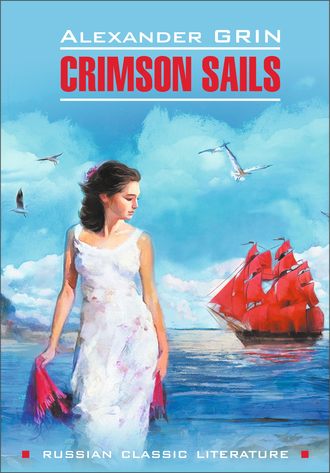
Полная версия
Scarlet Sails / Алые паруса. Книга для чтения на английском языке
If he did not want the trees to be trimmed they were left untouched; if he asked that someone be pardoned or rewarded – the person in question knew that it would be so; he could ride any horse he wished, bring any dog he wished into the castle, go through the books in the library, run around barefoot and eat whatever he pleased.
His father tried to put a stop to this and finally yielded – not to the principle, but to his wife’s wishes. He merely had all the servants’ children moved out of the castle, fearing that by associating with low society the boy’s whims would become inclinations that would be difficult to eradicate. In general, he was completely taken up with endless family lawsuits whose origins went back to the era of the founding of the first paper mills and whose end perhaps lay in the death of the last caviller.
Besides, there were affairs of state, the running of his own estates, dictating his memoirs, fox-hunts, newspapers to be read and an extended correspondence to keep him at a certain distance inwardly from the rest of the family; he saw his son so infrequently that he would sometimes forget how old the boy was.
Thus, Gray lived in a world of his own. He played all by himself – usually in the back yards of the castle which had once, in times of yore, been of strategic use. These vast, empty lots with the remains of deep moats and moss-covered stone cellars were overgrown with weeds, nettles, briars, blackthorn and shy bright wildflowers. Gray would spend hours here, exploring mole burrows, battling weeds, stalking butterflies and building fortresses of broken bricks, which he then shelled with sticks and stones.
He was going on twelve when all the implications of his soul, all the separate traits of his spirit and shades of secret impulses were brought together in a single powerful surge and, having in this way acquired a harmonious expression, became an indomitable desire. Until then he seemed to have found but disparate parts of his garden – a sunny spot, shadow, a flower, a great dark trunk – in the many other gardens and suddenly saw them clearly, all – in magnificent, astonishing accord.
This happened in the library. The tall door topped by a murky fanlight was usually locked, but the latch fit the mortise loosely and when pressed hard, the door would give, buckle and open. When the spirit of adventure urged Gray to make his way into the library he was amazed at the dusty light, whose effect and peculiarity were created by the coloured design of the leaded fanlight. The stillness of desertion lay upon everything here as on water in a pond. Here and there dark rows of bookcases adjoined the windows, blocking them halfway; there were aisles between the bookcases which were piled high with volumes. Here was an open album from which the centre pages had slipped out; over there were some scrolls tied with gold cord, stacks of sombre-looking books, thick layers of manuscripts, a mound of miniature volumes which cracked like bark if they were opened; here were charts and tables, rows of new editions, maps; a great variety of bindings, coarse, fine, black, mottled, blue, grey, thick, thin, rough and smooth. The bookcases were packed with books. They seemed like walls which had encompassed life itself within their bulk. The glass of the bookcases reflected other bookcases covered with colourless, shimmering spots. On a round table was a huge globe encased by a brass spherical cross formed by the equator and a meridian.
Turning to the exit, Gray saw a huge painting above the door whose images immediately filled the rigid silence of the library. The painting was of a clipper rising upon the crest of a tremendous wave. Foam coursed down its side. It was depicted at the very last moment of its upward flight. The ship was sailing straight at the viewer. The rearing bowsprit obscured the base of the masts. The crest of the great wave, rent by the keel, resembled the wings of a huge bird. Foam streaked off into the air. The sails, but vaguely discernible behind the forecastle deck and above the bowsprit, swollen by the raging force of the storm, were bearing back in their enormity, in order to, having gained the crest, righten themselves and then, tilting over the void, speed the vessel on towards new billows. Low, ragged clouds swirled over the ocean. The dim light struggled vainly against the approaching darkness of night. However, the most striking aspect of the painting was the figure of a man standing on the forecastle deck with his back to the viewer. It fully conveyed the situation and even the nature of the moment. The man’s pose (he had spread his legs far apart and flung out his arms) did not actually indicate what he was doing, but led one to assume attention strained to the extreme and directed towards something on deck invisible to the viewer. The hem of his coat was whipped back by the wind; his white pigtail and black sword were swept straight out into the air; the richness of his dress indicated him to be the captain; his dancing stance – the sweep of the wave; there was no hat; he was, apparently, completely absorbed by the dangerous moment and was shouting – but what? Did he see a man falling overboard, was he issuing an order to tack about or, shouting above the wind, was he calling to the boatswain? The shadows of these thoughts, not the thoughts themselves, took shape in Gray’s heart as he gazed at the painting. He suddenly felt that someone had approached him from the left and now stood beside him, unknown and unseen; he had only to turn his head to make the weird sensation disappear without a trace. Gray knew this. However, he did not snuff out his imagination, but harkened to it. A soundless voice shouted several curt phrases, as incomprehensible as if spoken in Malay; there followed the crash of extended avalanches; echoes and a grim wind filled the library. Gray heard all this within himself. He looked around; the stillness that was instantly re-established dispelled the ringing cobweb of his fantasy; his bond with the storm was broken.
Gray returned several times to look at the painting. It became to him that necessary word in the conversation between the soul and life without which it is difficult to understand one’s self. The great sea was gradually finding a place within the small boy. He became accustomed to it as he went through the books in the library, seeking out and avidly reading those behind whose golden door the blue glitter of the ocean could be seen. There, sowing spray behind the stern, the ships plied on. Some lost their sails and masts and, becoming engulfed by the waves, settled into the deep, where in the darkness gleam the phosphorescent eyes of fishes. Others, seized by the breakers, were battered against the reefs; the subsiding swell shook the hull dangerously; the deserted ship with its torn rigging was in protracted agony until a new storm shattered it to bits. Still others took on cargo uneventfully in one port and unloaded it in another; the crew, gathered around a tavern table, would sing the praises of a life at sea and down their drinks lovingly. There were also pirate ships that flew the Jolly Roger, manned by terrible, cutlass-swinging crews; there were phantom ships radiant in a deathly glow of blue illumination; there were naval ships with soldiers, cannons and brass bands; there were the ships of scientific expeditions, studying volcanoes, flora and fauna; there were ships enveloped in grim mystery and mutiny; there were ships of discovery and ships of adventure.
In this world, most naturally, the figure of the captain towered above all else. He was the fate, the soul and the brain of the ship. His character determined the work and the leisure of the crew. He selected his crew himself and it met his inclinations in many ways. He knew the habits and family life of each man. He possessed, in the eyes of his subordinates, magical knowledge, which enabled him to confidently plot a course from, say, Lisbon to Shanghai across the vast expanses. He repelled a storm by the counteraction of a system of complex efforts, squelching panic with curt orders; he sailed and stopped where he would; he was in command of the sailing and loading, repairs and leisure; it was difficult to imagine a greater and more sensible authority in a vital enterprise full of constant movement. This power, in its exclusiveness, and absoluteness, was equal to the power of Orpheus.
This notion of a captain, this image and this actual reality of his position occupied, by right of events of the spirit, the place of honour in Gray’s splendid imagination. No other profession save this could so successfully fuse into a single whole all the treasures of life, while preserving inviolable the most delicate design of each separate joy. Danger, risk, the forces of nature, the light of a distant land, the wondrous unknown, effervescent love, blossoming in rendezvous and parting; the fascinating turmoil of encounters, faces, events; the endless variety of life, while up above in the sky was now the Southern Cross, now the Big Dipper, and all the continents were in one’s keen eyes, though your cabin was replete with your ever-present homeland, with its books, pictures, letters and dried flowers entwined by a silken strand of hair in a suede locket on your manly chest.
In the autumn of his fifteenth year Arthur Gray ran away from home and passed through the golden gates of the sea. Soon after the schooner Anselm left Dubelt and set sail for Marseilles, with a ship’s boy aboard who had small hands and the face of a girl dressed in boy’s clothing. The ship’s boy was Gray, the owner of an elegant travelling-bag, patent leather boots as fine as kid gloves and batiste linen adorned with a crown crest.
In the course of a year, while the Anselm sailed from France to America and Spain, Gray squandered a part of his possessions on pastry-cakes, thus paying tribute to the past, and the rest, for the present and future, he lost at cards. He wanted to be a red-blooded sailor. He choked as he downed his liquor, and when bathing, his heart would falter as he dived from a height of twelve feet. He gradually lost everything except that which was most important – his strange, soaring spirit; he lost his frailty, becoming broad of bone and strong of muscle, his paleness gave way to a deep tan, he relinquished his refined carelessness of movement for the sure drive of a working hand, and there was a sparkle in his intelligent eyes as in a person’s who gazes into a fire. And his speech, having lost its uneven, haughtily shy fluidity, became brief and precise, as the thrust of a seagull at the quivering silver of a fish.
The captain of the Anselm was a kind man, but a stern seafarer who had taken the boy on out of maliciousness. He saw in Gray’s desperate desire but an eccentric whim and gloated in advance, imagining that in two months’ time Gray would say, avoiding his eyes: “Captain Hop, I’ve skinned my elbows climbing the rigging; my back and sides ache, my fingers don’t bend, my head is splitting and my legs are shaky. All these wet ropes weighing eighty pounds to balance in my hands; all these manropes, guy ropes, windlasses, cables, topmasts and cross-trees are killing my delicate body. I want to go home to my mamma.” After listening mentally to this speech, Captain Hop would deliver, also mentally, the following speech: “You can go wherever you want to, ducky. If any tar’s got stuck on your fine feathers you can wash it off at home – with Rose-Mimosa Cologne.”
Конец ознакомительного фрагмента.
Текст предоставлен ООО «ЛитРес».
Прочитайте эту книгу целиком, купив полную легальную версию на ЛитРес.
Безопасно оплатить книгу можно банковской картой Visa, MasterCard, Maestro, со счета мобильного телефона, с платежного терминала, в салоне МТС или Связной, через PayPal, WebMoney, Яндекс.Деньги, QIWI Кошелек, бонусными картами или другим удобным Вам способом.












